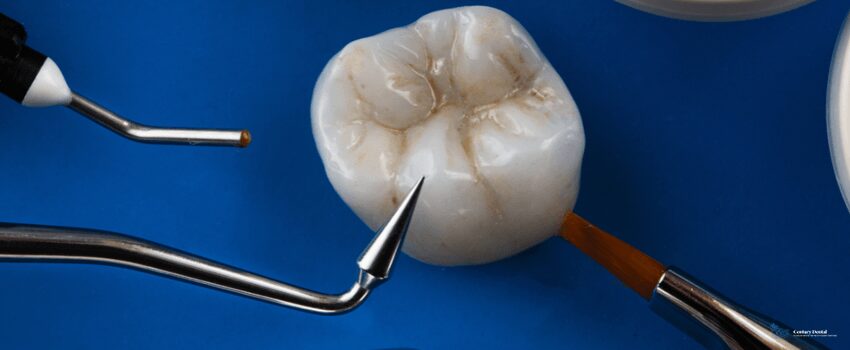Good, strong teeth are vital to oral health. However, your teeth will inevitably wear out and eventually get damaged. You can even damage your teeth from an accident or simply by not caring for them properly. For whatever reason, a damaged tooth is something we must face at some point in our lives.
Fortunately, dentists offer many solutions to this problem, including dental crowns. What are dental crowns? Continue reading to learn more about dental crowns, their uses, and how much they cost.
What Are Dental Crowns?
Dental crowns are caps that fit over your teeth. They protect your teeth while restoring their strength, size, and appearance. A dental crown may be necessary to:
- Keep a decayed tooth
- Keep a chipped tooth together
- Restore a broken tooth
- Cover and support a large filling in a tooth that is not fully healed
- Cover tooth discoloration
- Conceal misshapen teeth
- Protect an implant
- Keep a dental bridge in place
Types of Dental Crowns: Temporary vs. Permanent
Temporary crowns are made from inexpensive material based on molds of your natural teeth. Dentists attach them to protect your teeth from further damage while waiting for your permanent crown. You may use it for a few weeks until your permanent crowns are ready.
Permanent crowns are also made from the molds of your teeth, just like temporary crowns. But unlike their temporary counterparts, they’re made from more durable materials like ceramic, porcelain, and resin. Some cases may be fused to metals to provide sufficient support.
Different Types of Dental Crown Materials
Many factors influence the choice of materials for dental crowns, like:
- Color of nearby teeth
- The location of the tooth
- How much of your natural teeth are left
- Tooth function
- How much of your tooth is visible when you smile
- Gum tissue position
Dentists consider all these when helping you decide what type of dental crown you’ll need and what material they’ll be made of. Some of the most popular materials used to make crowns include:
All-resin
Resin dental crowns are typically less expensive than other crown types. However, they wear down over time and are more likely to break than porcelain-fused-to-metal crowns.
Pressed Ceramic
Pressed ceramic crowns have hard cores and replace the metal liner used in making all-ceramic crowns. They are capped with porcelain to achieve the best natural color match. They also last longer than an all-porcelain crown.
All porcelain or All ceramic
The best dental crowns for a natural color match are made of all porcelain or all ceramic. They are also an excellent choice for those allergic to metals. However, porcelain-fused-to-metal crowns are stronger. They can also damage the teeth adjacent to them. All ceramic crowns are a good option for replacing front teeth.
Metal
You have many metals to choose from for your dental crown, like gold, chromium, palladium, and nickel. Metal crowns are resistant to chips and cracks, last the longest, and only require a small amount of enamel to be removed. Their only main drawback is that they don’t look like natural teeth due to their metallic appearance. Metal crowns are best suited for out-of-sight teeth like molars.
Porcelain-fused-to-metal
This type of dental crown has a natural-looking tooth color to match the color of the teeth next to it. However, the metal underneath the crown’s cap can sometimes show through as a dark line. Its porcelain crown risks chipping off or breaking apart, damaging the adjacent teeth. Porcelain-fused-to-metal crowns are best suited for replacing a front or back tooth.
How Much Do Dental Crowns Cost?
Sometimes a crown is the only option for your dental problem. Consult your dentist if you experience any of the following issues:
- Cracked tooth
- Large tooth cavity
- A weak tooth
- Tooth decay
Dental crowns can cost anywhere from $800 to $1500, depending on their size and materials; gold crowns can reach $2500, while all-metal crowns are cheaper than gold or porcelain.
You might also need to pay for procedures such as root canal treatments or dental implants necessary to place a dental crown.
Your dental insurance may cover some of the costs, but it might only cover some types of crowns. Call your insurance provider for more information on their dental crown coverage.
Dental Crowns: Procedure
Two visits are often required for dental crown procedures. The first visit is focused on cleaning and preparing your teeth. Your dentist might need to take an X-ray of your teeth to assess the health of the tooth roots and surrounding bones. They may also perform root canal treatments if you have severe tooth decay or infection.
Once all of these are done, your dentist will do the following:
- Numb the teeth that will receive the crown and the gum tissues surrounding it.
- Reshape the tooth.
- Take impressions of your teeth to ensure the crown won’t alter your bite.
- Send the impressions to the laboratory that will manufacture your crown.
- Place a temporary crown to protect it while waiting for the permanent one.
Crowns are cemented in place during the second visit. To do this, your dentist will:
- Remove the temporary crown.
- Numb the tooth with a local anesthetic.
- Cement the permanent crown firmly in place once the local anesthetic has taken effect.
Dental Crowns: Aftercare
Caring for your crowns helps extend their lifespan. Here are some tips to help you get started:
- Flossing your teeth every day keeps your teeth and crowns in top shape.
- Be gentle when brushing your teeth twice daily. Consider using toothpaste made for sensitive teeth if your crown or the teeth surrounding it are sensitive to heat and cold.
- Your dentist may recommend using a nightguard to protect your crowns and surrounding teeth if you grind or clench them at night.
- Avoid eating foods that are too hard. If you have a porcelain crown, chewing on ice or hard foods can crack it.
Key Takeaway
Dental crowns come in many styles, types, and colors. Some may be more appealing to you than others and suit your needs better. They are also not difficult to care for; you only need to care for them just as you would your natural teeth. Discuss your needs with your dentist to determine the correct type of crown for you.
Do you need a dental crown? Century Dental is here for you.
Century Dental is your best choice if you are looking for a licensed dentist in Madeira Beach, FL, and the surrounding areas. We have a team of experienced dental professionals who can help you find the best dental crowns that suit your needs. Let us take care of your smile and oral health.
Make an appointment today.





